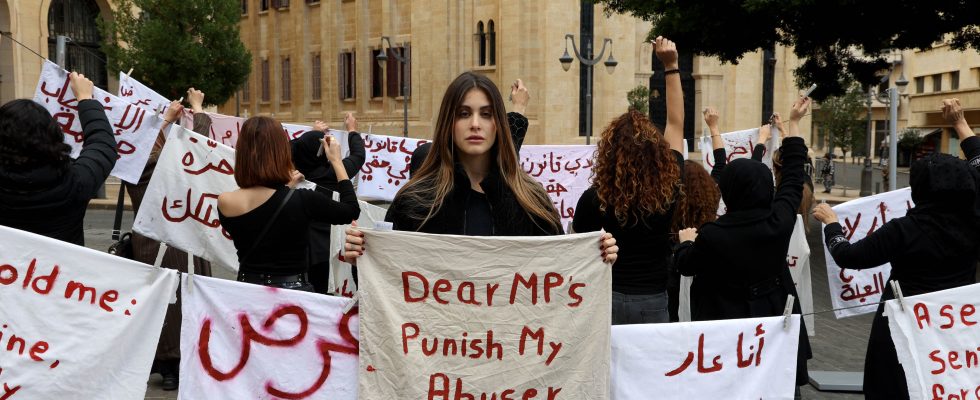“When I get out of prison, I will shoot you one by one!”, this is what a husband guilty of feminicide launches to those who dared to snatch his weapon after he shot his wife in cold blood with four cartridges lead with his hunting rifle, in a district of Tripoli, in the north of Lebanon. On this side of the world, women wrapped in shrouds have the fate of baby birds wrapped in bread soaked in grenadine molasses, the kind we ate as children. I loved to swallow them two by two without realizing the stakes of the hunt. Of everything that had to be put in place for them to arrive on our plates. Point the gun, wait, and shoot. This is what Issa Soumaya did, on February 28, in front of the door of the home of his wife, Mona Homsi, guilty of having left him three years earlier to flee the domestic violence he was inflicting on her. They rolled her, too, in a shroud, like a baby bird in bread, despite unanswered legal appeals from the authorities.
Six women have died this way since the beginning of the year
A situation in the image of this country in deficit of State, of justice, plagued by corruption and negligence. Six women have already died since the beginning of the year as a result of this domestic violence relieved of all legal recourse due to a functional state that has been absent since the start of the economic crisis. Where the judicial structures are tackling when they are not on strike and arrested for months now, impunity is growing.
Less than a month later, barely a week ago, in the southern suburbs of Beirut, a man shot and killed his wife in front of her children, for having dared to post photos of her unveiled on the social networks. Since then, the debate has ignited. Honor killing or feminicide? The hell of domestic violence hides in the nuances. Civil society is mobilizing to demand greater accuracy in the terms used. The relatives of the victim as of the killer himself – sympathizers of honors to be washed away in blood – evoke an honor killing. And whose honor first? Since when does a woman’s face, her veil, or her ass honor a man? The worst thing about this case of sordid morals is that the absurd reaches its peak with the commentary of the brother of the deceased victim. “I would have done the same thing, he declared, shortly after the crime, if her husband had not done it.”
Women are disposed of as property
Thus, in the absence of justice, husbands, brothers-in-law, brothers, fathers-in-law and fathers agree to consider their wives, sisters, daughters-in-law, daughters, etc. like a property that one disposes of like a good, a table or a chair. That she was killed in front of her children and that we fear for the psychological state of these kids now in the care of a father who would not hesitate to attack them at the slightest annoyance, does not worry no justice mobilized at the slingshot. To date, the murderer in question has disappeared with his children, who are also properties of the father, a sacred symbol of this patriarchy that has gone unpunished for too long. This deeply affected society will undoubtedly seek its pathology in this poem that my daughter in CE1, back from school, recited to me, to my great amazement.
Alef and ba’ (Arabic alphabet either A and B) ya3neh (that is to say) ab (as it is pronounced) or ab for father “… So this poem immediately unfolds in my stunned ears the letters of the alphabet to name the members of a family. Thus, continues my daughter:
– Alef mim ya3neh oum (mother) alef kha’ya3neh akh (uncle), jim dal ya3neh jad (grandfather), 3ayn mim ya3neh 3am (uncle). O God preserve our family!
I go on immediately and point out to him the absence of female members in this mumbling poem. No aunt. No sister. No grandmother. The female members of the family are erased, apart from the mother, of course, named here thanks to her ovaries carrying the future males of the family from whom she will be deposed at the slightest attempt to file a complaint for domestic violence or even to divorce. I tell him more simply.
– But where are the girls, my daughter, in your poem?
The fight is also linguistic
She is silent, looks at me and begins by telling me as a good student formatted by this rotten system to the core.
– It’s not my problem
– If my daughter, that’s your problem. And your brother, if you had had one, wouldn’t have appreciated having you eradicated in an otherwise stupid poem, you and all the other female members of the same family. No, we don’t shoot girls like baby birds dipped in molasses. Yes, you have the right to have your image and your body. Yes, you are entitled to your presence in a poem. Yes, the fight is also linguistic. And yes, it begins in a poem, my daughter.
